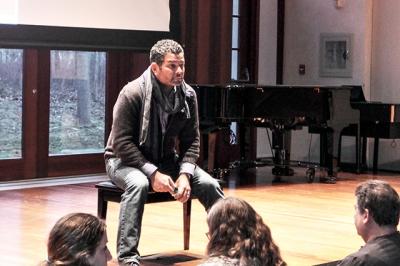‘Birdman’ Writer Shares Secrets for Success

For the first time in its 16-year history, the Hamptons International Film Festival’s Screenwriters Lab included a master class that was open to the public, and the public turned out in force, filling the theater in the Ross School’s Senior Thesis Building on Saturday afternoon for an hour with Alexander Dinelaris, one of the Oscar-winning writers of “Birdman: Or the Unexpected Virtue of Ignorance.”
Holding forth at warp speed, Mr. Dinelaris delivered more like three hours worth of information, advice, anecdotes, and observations, all leavened with humor, candor, and instructive clips from both “The Godfather” and “Birdman.”
“Everybody knows there’s no one way to do this,” he said at the outset. “All the instructional books are Aristotle for dummies. And I mean that in a good way. Structure is structure, and it has been forever. If you want to make a movie that’s unstructured, that’s fantastic. You just should know the structure before you blow it up. ‘Birdman’ was structured to within an inch of its life.”
A key principle Mr. Dinelaris cited was Aristotle’s idea of surprising inevitability. “When you craft a story — or a dirty joke — we want the ending to be both surprising and inevitable.” Or, as the Greek philosopher himself put it: “Tragedy represents not only a complete action but also incidents that cause fear and pity, and this happens most of all when the incidents are unexpected and yet one is a consequence of the other.”
The surprise, or reversal, keeps the audience wondering what will happen next, and one of the keys to this, according to Mr. Dinelaris, is dialogue. “If you stand above your characters, if you know what they’re going to say and how they’re going to say it, they won’t surprise you. And if they don’t surprise you, they won’t surprise anybody. You have to be on the page, know what the scene is, know what you’re trying to write, then put yourself in the place of that person. Then you’ll find yourself saying something you didn’t expect to say.”
He elaborated on the idea of action/conflict/reverse, using as an example the penultimate scene in “The Godfather,” when Diane Keaton’s character asks Al Pacino’s if he really killed his brother-in-law. “The action is when Diane asks if it’s true. The conflict is when he angrily says, ‘Don’t talk to me about my business.’ The reversal happens when he says, with seemingly heartfelt honesty, ‘It’s not true.’ Because the audience knows it is true, it’s left wondering what will happen next.” Does Diane accept his answer? Or does she no longer trust him, and where will that disillusionment lead? According to Mr. Denalaris, that lack of resolution is what the writer should strive for.
He took questions from an audience that included other writers, among them Debra Granik, co-author of “Winter’s Bone,” which he called “definitely one of the best movies of the last 10 years.” He said that while “a lot of people can write a good screenplay, very few can write four or five” and cited William Goldman, Lawrence Kasdan, and Nora Ephron as examples of the latter. The good news, he said, is that “for the first time in history, demand outweighs supply. If you have something that’s well written, you’re going to get seen. People are begging to read good scripts, because mediocre ones come in by the truckload.”
